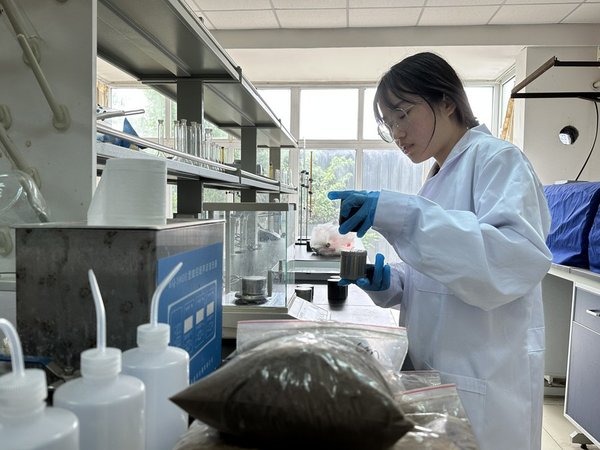Rural Sci-Tech Station Fieldwork Bears Fruits for Farmers, Students
 |
| Gao Jie, a postgraduate from the Beijing University of Agriculture, processes soil samples at a rural sci-tech station in Beizhai Village, Pinggu District of Beijing, capital of China, May 16, 2023. [Xinhua/Tian Chenxu] |
BEIJING, June 14 (Xinhua) — As the dawn breaks, postgraduate Gao Jie, wearing sun-proof clothing and a hat, drives an electric tricycle with her two classmates, heading to the apricot farm.
After unloading tools like shovels and sample bags, they select three trees, dig some soil near the trees and put it into the bags for lab analysis.
"Soil is just like life. It also needs physical examinations," said Gao, adding that previous analysis has shown that most of the apricot trees are overfertilized, harming their growth.
Gao and her classmates from the Beijing University of Agriculture are dispatched to a rural station at Beizhai Village, Pinggu District in suburban Beijing.
The rural station, known as "the tiny yard of science and technology," allows students like Gao to perform field research on farmers' plots, while farmers can gain direct access to advanced agricultural techniques.
Surrounded by mountains on three sides, the village, with its unique climate and soil conditions, is ideal for the growth of red apricots.
However, due to long-term extensive management, villagers saw a shrinking apricot yield, with the fruit quality declining year by year, despite various efforts.
In 2019, experts from the university visited the village, finding that villagers were in shortage of scientific knowledge of fertilization and pest control, and the experience of online sales.
"We then contacted relevant departments and set up the rural station. In this way, postgraduate students are stationed here by turns, and the instructors regularly visit the rural station to help with troubleshooting," said Jia Yuehui, a professor at the university.
Jia said the countryside is a special classroom that brings the students extra experience for learning and research.
"Some students were too shy to speak in public. Now that they talk to villagers every day, their communication capability improves a lot," she said, adding that some students have developed multiple skills, such as claiming compensation for hail damage and creating QR codes for online sales.
The students, many growing up in cities, also learn from the farmers.
Kong Fanli, an experienced apricot farmer, told the students that the weed under the trees helps absorb some humid heat in summer, and therefore should not be removed.
"With the weed, the apricots will not have peeling skin caused by heat waves," said Kong.
Facing problems that the students cannot solve, the instructor team will show up to help.
Farmer Yu Jihong turned to the experts as a brown gelatinous substance oozed from the bottom of some of his tree trunks as if "the trunks are bleeding."
Liu Jie, an associate professor sent to the village, said the glue-like substance is the cell sap inside the trees. He said the cell sap leakage is caused by bacteria infection, as overfertilization has led to weak trees.
Liu advised Yu to reduce fertilization and apply some lime sulfur after clearing the cell sap on the trunk surface.
"After I listened to the advice from the expert, my anxiety is gone," said Yu.
Liu Fudong, Party chief of the village, said the apricot planting in the village is gradually becoming scientific thanks to the rural station. With the help of the students, the village has set up an online shop, with half of the apricot yield sold online last year.
Figures show that the number of rural stations of science and technology has exceeded 1,000 across China, providing a new model for scientific research, social services, personnel training and agricultural development.
(Source: Xinhua)
Please understand that womenofchina.cn,a non-profit, information-communication website, cannot reach every writer before using articles and images. For copyright issues, please contact us by emailing: website@womenofchina.cn. The articles published and opinions expressed on this website represent the opinions of writers and are not necessarily shared by womenofchina.cn.








.jpg)

 WeChat
WeChat Weibo
Weibo 京公网安备 11010102004314号
京公网安备 11010102004314号